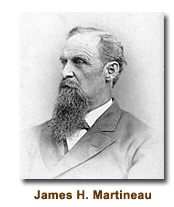An Indian Dinner Party
By James H. Martineau
The Paheed Indians, living in the valley of the Little Salt Lake, had given us considerable trouble and loss by stealing cattle. It was thought wise, in the summer of 1852, to give the tribe a dinner, hoping thus to make them more friendly and quit their depredations. So and invitation was given them, and at the appointed time a large number assembled at Parowan Fort.
A long table made of boards placed upon trestles and big enough for all, was laden with an abundance of the best we could furnish, consisting of a variety of vegetables, but no meat or groceries of any kind, the latter being unknown in the colony. And meat was something we could not eat oftener than once in three or four months. President Young had counseled us not to hunt game, for that belonged of right to the natives; no one thought for a moment of killing a cow, and a work ox was safe as long as he could pull a plow. But occasionally a jack rabbit became a victim, the excuse being offered that he had damaged someone’s garden.
But, the absence of meat did not trouble our guests. They hugely enjoyed the dinner as a great novelty, and ate until they could eat no more. When told they could carry away all the food left, their joy was full, and they quickly disposed of everything. But one fellow for a few moments was puzzled. Much of the food was summer squash, cooked quite thin, and mushy. This Indian had two pans nearly full which he wanted, but had no kettle or dish in which to take it. But “Necessity, the mother of invention,” gave him an idea. He wore buckskin leggings, reaching up nearly to his hips, and fastened to his belt. Taking off one legging, he tied a string around the lower end, thus making a bag into which his squaw poured the squash, and carried it away in triumph, as a serious difficulty skillfully overcome.
After dinner the chief, Kanarrah, made a speech, saying the Mormons were good to his people and he hoped they would overlook the stealing his people had done, and explained their temptations by saying, “You plenty bread, plenty cow, plenty horse, plenty everything. Me nothing, no bread, no cow, no nothing, but all the time hungry, squaw and papoose all time hungry. But we no more steal cattle.”
President John C.L. Smith then made a speech, telling the Indians to learn to work, to be industrious, and live like the Mormons, saying if they would do so they would multiply and increase, otherwise they would dwindle away and die out, and in a few years none would be left.
The Indians listened attentively, and we all thought they were thoroughly converted until Kanarrah, in three words upset President Smith’s whole argument. Pointing to our cemetery, he said, “Who lies there?” For the natives, that was enough. Every grave there contained a white man – not a single Indian. Not one of us could find a word to say. Never did I know three words to produce so great an effect, or to so easily overthrow an argument.
The “talk” being over, the natives as usual, began gambling, using a little round ball of wood, held first in one hand, then in the other, as parties sat upon the ground facing each other. If the other could guess rightly which hand held the ball as it was changed from hand to hand, he gained the bet, if not, he lost.
An Indian would gamble away all his property, even his clothes, and then gamble his wife or child away. Such a thing happened now. An Indian had thus lost his wife and told her to go with her new husband, but she did not like him, and slipping away from the crowd quickly entered our house – the nearest one at hand – and hid, first behind the door, and under some clothing which hung there; then in a moment crept under the bed, the next minute crawling out and running out the back door and down into a small cellar, the door of which was open.
Scarcely was she thus concealed when in rushed an Indian, knife in hand, his face like a demon’s. Without a word to us, he looked behind the door, then under the bed, then he tumbled the bedding to see if she could be hidden there. Not finding her, but certain she had entered our house, he rushed out the back way and went to the doorway of the cellar. Seeing the place was empty, he did not enter. Had he done so he would have seen the woman, who stood behind the door, and killed her.
The Indian next rushed to the corral, searched it carefully, and then went to the next one adjoining, and so on along that line of the fort, determined to find his prey. During this time the squaw showed her sagacity, by following him up from corral to corral, quickly going to one just searched by him, while he went on to another. We believe he never found the woman, as we never heard of her murder.
During all this time, which to us was one of much excitement, the other Indians seemed as unconcerned as if nothing unusual was happening.
Subscribe to:
Post Comments (Atom)



No comments:
Post a Comment